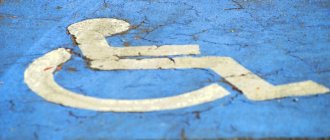The transfer of inheritance occurs according to the will or according to the law if the testator did not leave a will. There is also the option of actually accepting the inheritance, but it also does not relieve you of the need to formalize the rights to it officially with a notary or in court.
Among the heirs there are categories of citizens to whom the law allocates a mandatory share in the bequeathed property. Even if they are not specified in the will itself, these people have the right to receive part of the testator's property.
What does “mandatory share” mean?
A compulsory share is understood as a share in property transferred from a deceased person to people who are related or dependent on him.
In this case, the transfer of property occurs regardless of what is contained in the will. It often happens that a citizen transfers all his belongings and money to only one or a couple of people, although he has relatives. The legislation does not establish prohibitions on the disposal of the testator's belongings, but despite this, the expression of will cannot be absolute.
Important! If the testator has disabled parents or a spouse, such persons cannot be deprived of the right to inheritance.
Is an employee of the notary chamber obliged to explain, when drawing up a testamentary document, what actions a citizen must take in relation to persons classified as socially vulnerable? Yes, I must. Moreover, in practice, it most often happens that persons claiming inheritance in this order appear late.
It happens that after the will was drawn up, the spouse became pregnant or became disabled. It is not always possible to take such cases into account. If the testator has dependents, then other heirs cannot accurately calculate their share of the inheritance.
Is it possible to inherit an obligatory part of an inheritance? No, it is impossible, since it is personal and cannot be alienated. In addition, it is impossible to refuse obligatory parts for other heirs. You can only refuse the inheritance in full. Acceptance of property cannot be regarded as an obligation.
Who is entitled to a mandatory share in the inheritance?
Russian legislation defines the circle of persons entitled to an obligatory share in the inheritance, and also establishes the size of such a share. Persons entitled to a mandatory share include:
- disabled children, spouse, parents of the testator, as well as disabled dependents of the testator;
- minor children of the testator.
Disabled citizens are divided into two main groups:
disabled due to age (women over 55 years old and men over 60 years old) and disabled due to health conditions (disabled people of groups I, II and III).
The size of the obligatory share is no less than half of the share that would be due to the obligatory heirs during inheritance by law, i.e. if there was no will.
In accordance with the legally established procedure, the right to an obligatory share is satisfied as follows: the obligatory share is allocated first of all from the untested part of the inherited property. But if this (non-testamentary) part is not enough or the entire property is bequeathed, then the obligatory share is allocated from the bequeathed property. Thus, first of all, the right to an obligatory share reduces the share of the legal heirs, and only then, secondly, reduces the share of the heirs under the will.
Who is eligible to receive
All categories of persons who have the right to it can receive an obligatory share in the inheritance. Such categories are listed in Articles 1148 and 1149 of the Civil Code of the Russian Federation.
The law includes:
- persons under eighteen years of age;
- persons recognized as disabled;
- disabled parents of the testator;
- parents who have reached retirement age;
- disabled dependent spouses.
Persons entitled to receive an obligatory share in the inheritance can theoretically be differentiated into two types. The first type includes heirs by force of law who are close relatives. At the same time, they must be disabled and be dependents of the testator.
The second type of citizens includes disabled people who received financial support from the deceased. In addition, this category can also include those who do not enter into an inheritance by force of law, but before the death of the person who left the inheritance, they lived together with the latter and were dependent on him for one year (the situation is established by Article 1148 of the Civil Code of the Russian Federation).
Children of a deceased citizen who have not reached the age of eighteen, as well as children recognized as disabled, have the right to inherit no less than fifty percent of the share that would be due to them in the event of inheritance by force of law. This category of persons also includes spouses and parents recognized as disabled. This right is exercised regardless of what is contained in the will.
Who is recognized as disabled
The obligatory share is due to the minor children of the deceased owner, regardless of his will. In addition, the following will receive a share:
- Disabled children and parents (if the testator has, for example, an apartment, it will go to the child. Claiming rights to part of the property entitled to the baby can only be claimed after his birth).
- Disabled surviving spouse.
- Dependents who lived on the territory of the testator and at his expense for at least 1 year before the death of the owner.
Minors, people who have reached retirement age and disabled people not only of the first and second, but also of the third group are recognized as disabled. Recognition occurs through a medical and social examination, based on the results of which the citizen is issued a certificate confirming disability indicating the assigned group. To make a diagnosis, the following conditions must be present simultaneously:
- Health problems resulting in dysfunction of organs.
- Restriction or complete absence of the ability to move independently, carry out vital activities, the ability to communicate, study and work.
- The need for rehabilitation measures.
Persons of any age are recognized as disabled. A certificate issued by a medical institution is the basis for declaring one’s right to an obligatory share in the absence of a will in the name of a disabled person.
Who can claim the obligatory share
Receiving an obligatory share in the inheritance is determined by the right that any person may have. A complete list of persons who can claim a mandatory share can be found in the Civil Code of the Russian Federation. Among them we highlight:
- minors;
- disabled (officially, not just unemployed);
- parents with disabilities;
- retired parents;
- a relative with whom a dependent relationship is associated.
Based on this list, potential heirs can be divided into several categories. The first category will include legal heirs who receive their rights through family ties and through a will drawn up by the deceased. This may include applicants for the obligatory share - dependent relatives or disabled people.
The second category includes people who are not related to the deceased. They receive the right to inherit due to the fact that they lived with him immediately before his death. The period of dependent residence in this case must be at least 12 months.
Taking all this into account, the law makes certain provisions that relate to the children of the deceased. If at the time of death a person’s children have not reached the age of 18 or are simply disabled, they, regardless of the will, can claim at least half of the property that is due to them in the event of legal inheritance.
Receiving an inheritance by a disabled person
The rights of a disabled person to inheritance can be established on the basis of a will. This document is drawn up by the testator himself during his lifetime, which allows him to independently determine the circle of his successors after death. According to the Civil Code of the Russian Federation, the following conditions may be specified in a will:
- List of property recipients and the size of shares of each heir.
- Instructions regarding the conditions for receiving property after the death of the giver.
- A list of relatives who are unworthy of the rights to receive property after the death of the testator.
An inheritance for a disabled person of group 2 (or any other) can be obtained on the basis of a will, if this applicant is one of the heirs who have been granted the right of inheritance.
In the absence of a will, only the closest relatives of the deceased citizen can receive property. According to the order of inheritance, the priority right to inheritance belongs to the husband or wife, children and parents. Second in line are a brother or sister, grandparents. If a disabled person is among the priority recipients, he will be able to receive the property of the deceased.
If there are several main receivers, then the inheritance mass will be divided equally between them. In this case, the spouse can receive 50% of the inheritance (and take part in the division of the remaining property) if the property of the deceased was acquired jointly in an official marriage.
A disabled person has the right to participate in all stages of inheritance distribution. He can open it, challenge the will, and claim the obligatory share. If a disabled person is unable to do this due to health problems, then his will is carried out by a guardian. He will also manage the inherited property in the interests of the disabled person.
In what cases is a disabled person guaranteed to receive an inheritance?
The Civil Code regulates the possibility of inheritance of property by close relatives of the deceased, taking into account the order of their degree of relationship. Six months are given to submit the application, then each compulsory heir by law has an equal share of the inherited property.
If the owner decided to transfer his property to persons who are not heirs at the legislative level, and made a will before his death, then citizens who were not included in the disposal of the testator will not be able to lay claim to his property. However, relatives who are disabled in this case receive a share not allocated by the will.
Heirs of the first stage who are incapacitated persons can apply for a compulsory share. They are also required to declare their rights no later than 6 months from the date of death of the testator.
Who is considered disabled?
Based on Article 1149 of the Civil Code of the Russian Federation, some citizens have the right to receive ½ part of their share of the inheritance, which should have gone to the successor if the will had not been drawn up. Thus, disabled persons can apply for the obligatory part of the inheritance:
- legally married to the testator;
- children who have not reached the age of majority at the time of the death of the testator;
- those who are dependent on the deceased citizen and receive financial support from him;
- who are the parents or adoptive parents of the testator;
- children who have reached the age of eighteen and remain incapacitated.
In this case, citizens who have reached retirement age (men over 60 years of age and women over 55 years of age) or who are officially considered disabled are recognized as disabled. Recognition of disability is carried out in accordance with Decree of the Government of the Russian Federation No. 95 of 2006 on February 20 after a medical and social examination.
The following categories of disability are distinguished:
- 1 group (appointed for 2 years);
- 2 groups (set for a year);
- 3 groups (appointed for a year);
- disabled child (can be determined for 1 and 2 years, 5 years or until adulthood).
Interesting material : Valuation of shares for inheritance.
Calculation of the share due to a disabled person
Russian legislation provides that only those categories that are named in Article 1149 of the Civil Code of the Russian Federation as obligatory successors have the right to receive a part of the inheritance without fail. They can claim 50 percent of the portion that would have gone to them in the absence of a will.
It is possible to satisfy the right to receive an inheritance without fail from a share of the inheritance that was not willed, even if these actions reduce the rights of other heirs by force of law to such a share.
If the untested property is not enough to cover the obligatory share, the right will be satisfied from the bequeathed part of the property. The obligatory share includes everything that a person entitled to such a share can receive on certain grounds, as well as the amount of the testamentary refusal issued to such a person.
If the exercise of a citizen's rights to a share in the inheritance creates impossible conditions for the transfer to the heirs specified in the will, property that was used by the latter during the life of the deceased citizen (for example, residential premises or summer cottages) or was used by them as a means of obtaining their only income (for example, craft machines, etc.), but was not used by the obligatory heirs, the right to such property may be changed by a court decision.
Thus, when studying the financial situation of the heirs under the will, the obligatory share in the inheritance may be reduced or even canceled by the court.
In addition, those heirs who are reflected in Article 1117 of the Civil Code of the Russian Federation do not have the right to inherit if they are found unworthy based on a court decision. Accordingly, the mandatory part may be subject to reduction or increase at the discretion of the judicial authority.
If the heir, who has the right to receive a mandatory share, presents himself as a beneficiary of the inheritance, he will not be able to receive the share without fail.
If he refuses this provision and declares this to the employee of the notary chamber during the period of acceptance of the inheritance, he may receive a share of the inheritance without fail in accordance with the Civil Code of the Russian Federation.
In the event of such a refusal, on the basis of a court decision, the obligatory share of such a citizen may be reduced if the amount of property due to him by inheritance exceeds the amount spent on the maintenance of the person. The obligations to other citizens existing on the day of opening the inheritance case are also taken into account, as well as the average amount of expenses and standard of living before the death of the testator.
Example of share calculation
Let's look at calculating the size of the obligatory share of a disabled person's inheritance using a specific example. Citizen Novikov has a daughter and a son, who are the only heirs of the first stage.
Shortly before his death, the testator made a will, according to which a two-room apartment worth 3 million rubles went to his son. However, during the life of the testator, the daughter received a Group 2 disability, which made her an heir entitled to an obligatory part of the property.
Thus, upon entering into an inheritance, both children of citizen Novikov must receive certain amounts of shares in the apartment: ¾ of the premises will go to the son and ¼ to the daughter (according to Article 1149 of the Civil Code of the Russian Federation, a disabled person can claim half of the share that should have gone to him if if the will had not been drawn up).
Share calculation
The Civil Code of the Russian Federation states that disabled people or simply incapacitated citizens can receive a mandatory share in the inheritance. As we have already determined earlier, persons who could be obligatory heirs will claim half of what they would be entitled to by law. This share is immediately deducted from the total part of the property, which is transferred according to the will, after which the division takes place into shares.
If not the entire inheritance was transferred through a will, the obligatory share can be allocated from the part that is not affected by the will. If this part of the property cannot cover the obligatory share, it is separated from the general part of the will, after which the remaining operations are carried out.
The situation becomes more complicated if the exercise of rights to an obligatory share causes the creation of impossible conditions for the fulfillment of remaining powers to transfer inheritance. For example, if, due to the allocation of a mandatory share, the rights of the remaining heirs will suffer greatly. This can happen if they use tools or other property of the deceased to earn money. In this case, the conditions for the transfer of the obligatory share can be changed in court so as not to infringe on the rights of other heirs.
The result of litigation may be a very unusual situation in which the mandatory share will be reduced, if it exists at all. The court has the power to cancel the allocation of a mandatory share in the inheritance for a number of reasons. One of these reasons is the recognition of the heir as unworthy of allocating a mandatory share.
This can happen, for example, if the parents did not raise the child in childhood, he grew up with his grandparents, and after his death the parents began to lay claim to part of his property. In this case, family ties will be considered conventional, and the parents will be considered unworthy of inheritance.
The heir can refuse the property that is due to him by inheritance, even if we are talking about a compulsory share. The inheritance can be fully received only after six months, but you can refuse it earlier. Refusal of a share means that it will be divided among the remaining heirs depending on their shares. It is impossible to waive the obligatory share in favor of a specific heir.
How to get a mandatory share
Receiving a mandatory share from an inheritance by a disabled person, in essence, is no different from how other heirs receive their property - everything is carried out within the framework of civil legal relations.
After the death of the testator, all potential heirs will have six months to contact an authorized notary regarding issues of their inheritance. In this case, potential heirs must provide a package of documents that confirms their rights to the property. Just coming and reporting your existence is not enough; legal confirmation is needed.
Next, the notary will inform the heir about the amount of the state fee that must be paid to receive the inheritance. In general, of all the papers that need to be provided to the notary, we can highlight:
- identification documents;
- documents confirming the rights to the property of the deceased;
- statement;
- documents confirming disability or incapacity for work;
- other documents that the notary may legally require.
After providing all the certificates and paying the state fee, you can apply for an inheritance. The notary will draw up all the necessary papers and transfer the rights to receive your share of the inheritance. This is where the notary's work ends.
In order to get property at your disposal, you will need to contact Rosreestr or MFC - they deal with registration, execution and issuance of documents with the right to property.
Documents for receiving inheritance
When contacting a notary to obtain a mandatory share in the inheritance, a disabled person must provide a standard package of documents:
- Passport;
- Death certificate of the testator;
- Will (if one has been drawn up);
- Documents confirming relationship with the testator or other documents giving the right to claim the bequeathed property;
- In case of receiving real estate, shares in an enterprise, etc. property, you need documents establishing the testator's right to this property.
If the applicant does not have a will, he can contact a notary with a request to search for this document. If it is not found, then inheritance will occur according to law.
Benefits for a disabled person when paying state fees
Entering into inheritance is a legal procedure that requires increased attention. Acceptance of property is carried out in a notary's office, which conducts business in the area of the giver's last residence. The action plan when contacting a notary is as follows:
- Receive a death certificate and write an application for acceptance of inheritance.
- Provide the required package of documents to the notary.
- Pay the state fee and receive a certificate of inheritance.
The state duty is calculated based on the value of the estate and the degree of relationship of the heir to the deceased citizen. The first and second circle of relatives pay 0.3% of the price of the inheritance. All other applicants – 0.6% of the total assessed value of the property received.
Disabled people of the first and second groups can receive a discount when paying a state fee in the amount of 50% of the established amount.
When registering an inheritance, various situations may arise that can significantly complicate the entry process. At such times, it is best to consult a professional lawyer who can help. But such services are not cheap.
On our website you can get detailed and competent advice from a lawyer in inheritance cases, completely free and quickly. Write your question in a special window, and we will answer at a time convenient for you. This opportunity is a good way to be prepared to solve problems that arise when joining.
Cost of lawyers' services for registration of inheritance for an apartment
Consultations when registering an inheritance for an apartment
| Oral consultation about the registration process in the office | From 1 500 |
| Written consultations on design | From 2 300 |
| On-site consultations | From 3 200 |
Registration by lawyers of an inheritance for any apartment in the presence of a will
| Opening an inheritance case | From 5 000 |
| Collection of a complete set of documents to provide to the notary | From 3 000 |
| Obtaining a certificate of inheritance | From 4 500 |
| Registration through MFC | From 3 300 |
| Registration of refusal of share | From 4 000 |
| Allocation of OA | From 7 000 |
| Registration of turnkey inheritance for an apartment | From 6 500 |
Registration by human rights activists of inheritance for citizens for a building or apartment according to the law
| Preparation and submission of documents for registration | From 3 000 |
| Obtaining missing documentation from government agencies | From 2 500 |
| Checking the absence of other heirs who may subsequently challenge the registration of the inheritance | From 5 000 |
| Obtaining a certificate of inheritance from a notary | From 7 000 |
| Support during the allocation of OA (required shares) | From 6 500 |
| Registration of refusal of inheritance | From 3 500 |
| Carrying out the turnkey inheritance procedure | From 6 000 |
Legal services when registering an inheritance for an apartment
| Contesting a will | From 20 000 |
| Recognition of the heir's unworthiness | From 25 000 |
| Restoration of documents lost by the testator during his lifetime (metrics, marriage certificate, etc.) | From 10 000 |
| Comprehensive legal defense in other cases | From 15 000 |
Additional services when registering an inheritance for an apartment
| Collection of papers for Rosreestr | From 3 700 |
| Conducting an independent examination | From 7 000 |
| Support in the sale of an inherited home | From 10 000 |
| Registration of ownership | From 7 500 |
Lawsuits regarding inheritance
Sometimes the question of whether a disabled person necessarily has a share in the inheritance comes to court. This may also be due to the disagreement of other relatives to the division of property taking into account the interests of the disabled person. To go to court you must provide:
- A will certified by a notary;
- Medical documents on disability;
- Documents about family ties with the deceased (birth certificate, marriage certificate, etc.);
- A document stating that the disabled person was a dependent of the deceased (if he is not his relative).
However, legal nuances must be taken into account. Paragraph 4 of Article 1149 of the Civil Code of the Russian Federation states that if the heir indicated in the will used his property during the life of the testator, and there is no applicant for the obligatory share, then the court may reduce this share or even refuse to receive it. The basis for such a decision is an assessment of the financial situation of both heirs.
In general, legislation is aimed at protecting the rights of vulnerable social groups. Therefore, despite Article 1119 of the Civil Code of the Russian Federation, which postulates freedom of will, the right of a disabled person to an obligatory share in the inheritance has been established. In practice, if the testator agrees that all of his close relatives should receive the inheritance, he does not need to make a will. Often this document is drawn up precisely in situations where there is a risk of disputes between heirs and when the testator himself wants to exclude one of them from the list of applicants for his property.
Waiver of the obligatory share in the inheritance
Heirs have the right to refuse inheritance. The law does not limit them in this right.
However, it is impossible to renounce the obligatory part of the property in favor of other persons.
A refusal cannot be established against anyone. The part of the inheritance recognized as non-inherited is divided among other persons.
Do legal representatives of young children have the right to refuse a share in the inheritance? Yes, they do.
However, for this it is necessary to obtain the consent of the guardianship and trusteeship authority.
You can refuse an inheritance by submitting an application within a six-month period.
What is a waiver of an obligatory share of inheritance?
Not all relatives of a deceased person fully understand what legal opportunities open up when opening an inheritance case. When the testator indicates the name of the recipients of the property, this does not mean that only the persons mentioned in the order will be able to claim inheritance. At the legislative level, there is a whole list of citizens who are under special protection and who receive a mandatory share in inherited property. Usually, we are talking about incapacitated or minor persons.
If such persons are not mentioned in the last will, they can claim part of the property after death. Each of the participants in the inheritance case and interested parties, considering their rights to be violated, can challenge the will in court.
Even in the absence of heirs who want to take over the property rights after the deceased, the notary’s task is to identify all beneficiaries (this provision is fixed in Article 73 of Law No. 4462-1) and take measures to allocate the obligatory part.
If the applicant has the right to an obligatory share, it is satisfied through the acceptance of assets not specified in the will, and in its absence, through a reduction in the volume of the bequeathed property.
Not everyone agrees with such a distribution, when persons who did not take part in the life of the deceased in recent years received part of the inheritance. If you disagree with the procedure for distributing property between all participants, they turn to the court. During the period of the proceedings, the term of the inheritance case is suspended. As soon as the judge makes a decision and it comes into force, the period for accepting the inheritance resumes.
Is it possible to refuse the obligatory part of the inheritance?
The heir may refuse to accept the part of the inheritance due to him by law. In this case, the division of the entire inheritance is carried out according to the last will of the deceased. For example, if a person of retirement age is sufficiently wealthy, has his own home and a profitable job, he may not need to receive additional privileges. Although, according to the law, he belongs to the disabled category of citizens who have the right to an obligatory share of property.
At his own request, the testator may waive the right to receive property, but this decision must be final. You should think carefully about everything and weigh the pros and cons, since you will not be able to change your mind.
Applicants under 18 years of age cannot apply for a waiver on their own.
When can you refuse part of an inheritance?
The right to renounce an inherited share of property arises after the death of the testator or his recognition as dead in court (Article 1157 of the Civil Code of the Russian Federation). A person who is entitled to a certain share in the inheritance has the right to refuse within 6 months from the date of opening of the inheritance.
The legislation provides for the possibility of renouncing an obligatory share in the inheritance in favor of one of the heirs who is such by law or by will. However, this does not apply to the compulsory share; its inheritance occurs under special conditions - in case of refusal, it is not allowed to indicate the persons in whose favor the property should pass.
When refusal is not possible
The Civil Code of the Russian Federation provides for cases when a ban is imposed on refusal of inheritance in favor of specified persons. They are specified in Art. 1157, 1158, 1159. In general, such cases can be generalized into 3 groups:
- The property is escheatable. This is reflected in Art. 1157, 1151 Civil Code of the Russian Federation. If there are no heirs or they did not accept the inheritance, refused it or were found unworthy, the inheritance in the form of a residential premises, land plot or share in common property becomes the property of the state, and the residential premises becomes part of the housing stock for social use.
- Inheritance is a mandatory share for citizens, the circle of whom is outlined in Art. 1149 and 1158 of the Civil Code of the Russian Federation. They are disabled children, parents and other citizens who have been dependent on the testator for at least 1 year, for whom he was the main source of financial assistance.
- From property inherited under a will, if all the property of the testator is bequeathed to the heirs appointed by him.
In this case, the inheritance can be refused unconditionally, without specifying the persons in whose favor the property is transferred.
- Refusal in favor of any of the specified persons, if there is a will and according to it, if the heir refuses the property, it passes to another heir, whose identity is previously established in the will of the deceased (clause 2 of Article 1121 of the Civil Code of the Russian Federation).
If desired, the heir will not be able to renounce part of the inherited property in the inheritance mass, since, according to Art. 1158 of the Civil Code of the Russian Federation, only the entire property can be inherited. For example, if the heir does not want to accept the debts of the deceased, this will mean that he renounces all inherited property.








